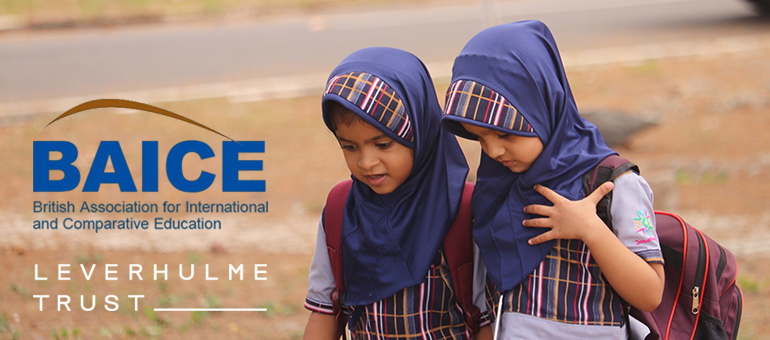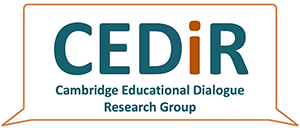Rethinking Islamic Education for the 21st Century – Research into Practice
About this project
‘Cambridge Dialogues’ is an innovative international network in an emerging field. It draws together twenty Muslim academics who work at the cutting edge of ‘close to practice research’ in Islamic schools and education settings across the world. Initiated by early career researchers, who have a track record within Muslim teacher networks, this project applies a much-needed critical lens to the aims, philosophy, pedagogy and practice of Islamic education. The project seeks to update and innovate within a field, which in many cases is still using transmission-based teaching methodologies. The project is led by Dr Farah Ahmed and is housed within the ‘Cultural, religious and philosophical traditions in educational dialogue’ research strand of the Cambridge Educational Dialogue Research Group (CEDiR).
Through a series of online workshops and working papers, this project aims to meet the pressing challenge of the fragmented personal identities and bifurcated educational experiences of Muslim children and young people. Muslim children and young people have dual educational experiences, which are incongruous and bifurcated. They experience national ‘secular’ curricula and ‘modern’ teaching methodologies on the one hand and ‘traditional’ transmission-based knowledge rich curricula, often taught through memorisation and rote learning, on the other hand (Anderson, Tan, & Suleiman, 2011; Berglund & Gent, 2019). Often, this is happening in the same school. It applies both to schools in Muslim-majority contexts and the growing number of Islamic faith schools in Muslim minority contexts. Recent work such as the edited volumes on ‘Philosophies of Islamic education’ (Memon & Zaman, 2016), and ‘Curriculum Renewal for Islamic Education’ (Memon, Alhashmi & Abdalla, 2021) have raised a number of questions about how and why it is necessary to redesign Islamic pedagogy and curricula in the K-12 sector globally.
The academics in this network contend that Islam has a rich tradition of critical thinking and holistic education, which has over time become marginalised. We draw upon a range of educational thought within the classical Islamic ‘tradition’ to chart a way forward that incorporates questioning, reflection, and engagement with ‘secular’ ideas. The aim is to devise a more holistic approach that prevents a dichotomous educational experience. We contend that such a dichotomous experience may lead to the assumption that Islam and the secular are at odds with each other. By centering the variety of Muslim ‘lived experiences’ and differences in understanding Islam, we aim to provide a community led counter narrative to a dominant lens which views Islamic education, and its’ supposed disconnect with the modern world, through a counter-terrorism and anti-extremism discourse that begins from an assumption of Muslims as the dangerous other (Taylor & Soni, 2017).
Project aims
We aim to develop a holistic philosophy that offers a more inclusive approach and a radical departure from existing educational practices, whilst maintaining respect for the Islamic ‘tradition’. We seek to update practice in Muslim majority and minority settings, through the introduction of critical and creative thinking, updating curricula to reflect contemporary needs, and developing child-centred pedagogy. We anticipate that devising conceptualisations of Islamic personhood and identity will be a key thread that runs through these dialogues. Ideas on updating pedagogy and curricula need to be underpinned by clarity on ideas of Muslim personhood, human development, learning and education.
Ethos
The ethos of these dialogues is democratic, this means that next steps will be collectively decided at each stage. In addition, public consultation will lead to published ‘public feedback’ to the working papers. Participants of the Cambridge Dialogues are situated across a broad spectrum of culture, nationality, ethnicity, and religious interpretation, but they share three principles: first, the importance of Muslim educational self-determination across our differences; second, the imperative of educational integration between epistemically-diverse learning communities; and third, the importance of working at the interface of research and practice.
Activities
Workshops:
We hold monthly dialogic virtual workshops for a core group of fifteen to twenty academics with experience working in educational settings. These are organised around a series of key questions which build on each other. An asynchronous online forum allows for pre and post workshop engagement.
Publications
Emerging theory, suggestions for practice, and key recommendations are to be published as a series of working papers.
Open events and Consultations
Regular public presentations and consultation sessions. Presentations on the working papers inviting public feedback, short ‘provocations’, case studies and mini videos on key themes will facilitate an open forum for public dialogue.
Conference
Towards the end of the project, the core group will work on project proposals for future research. A final face-to-face 3-day symposium, live streamed online, will draw the project to a close.
Early Career Research Team
- Dr Farah Ahmed, University of Cambridge, UK
- Dr Claire Alkouatli, Adjunct Research Fellow at the Centre for Islamic Thought and Education, University of South Australia and Development Consultant, Princess Noura University, Saudi Arabia
- Mr Dylan Chown, PhD Student and Lecturer, Centre for Islamic Thought and EducationUniversity of South Australia, Australia
- Ms Dina El Odessy, Deputy Director of Alexandria International School, Egypt and PhD Student, University of Oxford, UK
- Ms Arwa Hanif Al-Qassimi, PhD Student, University of Cambridge, UK
Core Group Participants
- Dr. Mariam Alhashmi, Assistant Professor, College of Education at Zayed University, UAE
- Dr Safarak Chowdhury, Researcher - Beyond Foundationalism Project, Cambridge Muslim College, UK
- Dr. Amaarah DeCuir, Executive Board Member, Center for Islam in the Contemporary World, Shenandoah University and Lecturer, School of Education, American University in Washington, USA
- Dr. Susan Douglass, Education Outreach Director, Alwaleed Center for Muslim Christian Understanding, Georgetown University, USA
- Ms Fatima D’Oyen, Education Consultant and Independent Researcher, US and UK
- Ms Basma Elshayyal, Independent Researcher, UK
- Dr Fella Lahmar, University of Bolton, UK
- Dr Samir Mahmood, Assistant Professor at the Lebanese American University, Lebanon
- Dr Nadeem Memon, Senior Research Fellow, Centre for Islamic Thought and Education (CITE) in the School of Education at University of South Australia, Australia
- Dr Abdullah Trevathan, Lecturer, Al Akhawayn University, Morocco
Funding
The project is generously funded by the BAICE Building Research Capacity and Networks Competition. The project is also part of Dr Farah Ahmed's Early Career Research Fellowship, generously funded by The Leverhulme Trust.
Public Launch Event
An open launch event will be held via Zoom
- 12:00pm BST
- 16 April 2022.
- Register here.
Contact details
Email: fa287@cam.ac.uk or aha42@cam.ac.uk
References
Anderson, P., Tan, C., & Suleiman, Y. (2011). Reforms in Islamic education: report of a conference held at the Prince al Waleed bin Talal Centre of Islamic Studies University of Cambridge. Cambridge, UK: Centre of Islamic Studies University of Cambridge.
Berglund, J., & Gent, B. (2019). Qur’anic education and non-confessional RE: an intercultural perspective. Intercultural Education,0(0), 1–12.
Memon, N., & Zaman, M. (Eds.). (2016). Philosophies of Islamic Education: Historical Perspectives and Emerging Discourses. New York: Routledge.
Memon, N., Alhashmi, M & Abdalla, M. (Eds.). (2021). Curriculum Renewal for Islamic Education: Critical Perspectives on Teaching Islam in Primary and Secondary Schools. New York: Routledge.
Taylor, L., & Soni, A. (2017). Preventing radicalisation: a systematic review of literature considering the lived experiences of the UK’s Prevent strategy in educational settings. Pastoral Care in Education, 35(4), 241–252.


